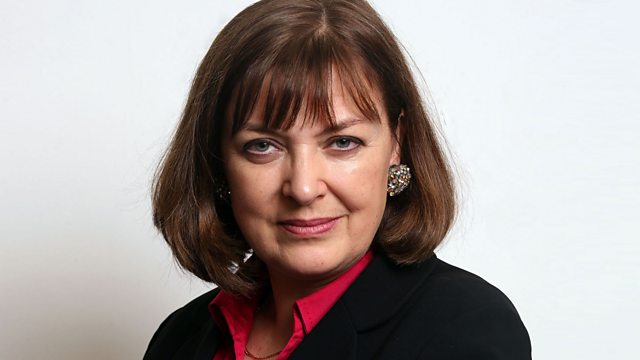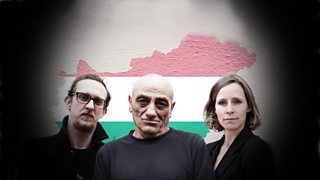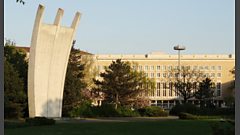
The Berlin Blockade
In 1948 Stalin blockaded Berlin. Would Britain and America do anything to help the Berliners? Bridget Kendall hears from three of them about life under the blockade.
As part of her series tracing the crucial turning-points of the early Cold War, Bridget Kendall tells the story of the Berlin Blockade - with the help of three people who lived under the Blockade for a year.
In 1948, Stalin was alarmed and frustrated by moves by America, Britain and France to forge the Zones of Germany that they occupied into a new state - what would become West Germany.
But the Western Allies had a weak point - Berlin was surrounded by the Soviet Occupation Zone, and within the city, Britain, America and France each ran a sector. So Stalin retaliated by placing the Western sectors under Blockade in a bid to drive the Western Allies from the city.
Would the West help the stranded Berliners? How could it, without risking World War Three? Would it leave them to their fate - either starvation or Soviet occupation?
Bridget Kendall hears from three young Berliners of the time about how the hungry city held its breath. And how the West scrambled to establish what had been thought impossible: an Airlift to feed well over two million people a day.
And she explores how the eventual against-the-odds success of the Airlift had a consequence Stalin hadn't intended - driving the Western nations together into a more cohesive military bloc to oppose Soviet-dominated Eastern Europe.
With: Jürgen Blask, Gisela Bilski, Gerhard Bürger
Producers: Phil Tinline and Sabine Schereck.
Last on
On the trail of the Berlin Airlift
Sabine Schereck grew up in Berlin and co-produced the Berlin episodes of the Cold War series. Here she reveals how the events covered in the series are still etched into her native city.
Just riding up and down the U6, one of Berlin’s tube lines, ensures that you are reminded of the Berlin Blockade every time you pass the stop ‘Platz der Luftbrücke’ – Square of the Airlift. It is, of course, named after that very square which received its name just a month after the blockade was over in May 1949. It is in front of Tempelhof Airport, where the main action took place. The Airlift Memorial has stood in that square since 1951. (The city is great at memorials.)
In Berlin, you learn all this at school – at least that was the case in the 1980s in West Berlin. I guess my East Berlin counterparts might have been taught a very different story, if the Berlin Airlift was on the syllabus at all.
Learning about the airlift as a child, the term ‘Rosinenbomber’ was inextricably linked to the events. The literal translation would be ‘raisin bombers’. They refer to the airplanes that dropped sweets on little parachutes made of handkerchiefs. In the collective memory, however, all planes that were part of the airlift are known as Rosinenbomber, and you can still find them in Berlin.
The Deutsche Technik Museum has a Douglas C 47 on display. It is conveniently placed on a massive balcony and, again, when riding on the tube, this time on the U1 between the stops Gleisdreieck und Möckernbrücke, you can’t miss it.
The Allied Museum, too, prides itself on its Rosinenbomber, a Hastings TG 503 from the Royal Air Force. There is even the opportunity to go inside and learn how on short flights, it was filled up to the rafters, while, on longer ones, a little alley was left so that the pilots could access the toilets at the back.
There are also cans of milk powder, which are apparently still good as they were made to last for 200 years. So, just in case, at the museum’s storage at Tempelhof Airport, a few are left.
Shortly after the blockade reserves were made, which were intended to supply Berlin for six months. These reserves, worth more than 4 billion Deutschmarks, were not dissolved until 1991. A quarter of them, mainly food, was donated to the Soviet Union.
It was a great privilege to meet the interviewees and hear their vivid stories about these times. Gerhard Bürger, who worked as a fire officer at Tempelhof Airport, told me that even a cow was brought to Berlin on a plane. It had relieved itself on the plane and it was then their job to give the plane a good clean.
The black market, which flourished before the blockade, was still a vital way for Berliners to get by, and American cigarettes were highly sought after.
Getting them from pilots was one thing, getting them out of the airport was another as the Americans were not allowed to engage in these dealings in the first place.
But Gerhard Bürger told me about the ways people smuggled them out of the airport, for instance via a tunnel to the nearby tube station.
Gisela Bilski told me about smuggling food from East to West Berlin - and also about the change in the border police. At the beginning they were Berliners, who would stick together and turn a blind eye. Later policemen from Saxony were brought in, who had no sympathy at all and were therefore called the ‘fifth occupying power’ by the East Berliners .
As a 13-year-old she was arrested for attempting to smuggle food to the West. She spent a weekend in prison. After her release the authorities forbade her to talk to anyone about where she had been that weekend. Only after the Berlin Wall had fallen in 1989, she broke her silence.
Jürgen Blask remembered how he could distinguish the airlift planes by the noise they made.
An important legacy of the blockade is Tegel Airport. It was built in the French Sector in just three months. As a result a Russian radio mast had to be removed. That did not go down well with the Communists. After that no Western publications were allowed in the East Sector. So when crossing the border on the train from West to East, you were best advised to hide your newspaper in a bag to avoid being arrested.
Tempelhof Airport was closed down in 2008. In 2015 a referendum was held about what was to become of that large empty field. Berliners decided to leave it as a park and communal area - and not to hand it over to developers.
The space not only gives you a sense of freedom - with its heritage, it symbolises freedom. The fact that the city has chosen a park and freedom over profit makes me proud to be a Berliner.
After all, President John F. Kennedy set an example by declaring: “Ich bin ein Berliner”. That was in 1963 - when he came to city to celebrate the 15th anniversary of the Berlin Airlift.
Broadcast
- Thu 7 Jul 2016 13:45����ý Radio 4
Foreign Bodies: Keeping the Wolf Out
Podcast
-
![]()
Cold War: Stories from the Big Freeze
Bridget Kendall presents an oral history tracing decisive moments of the Cold War.



